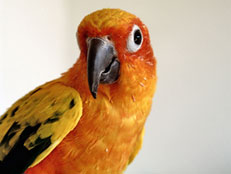
A Conure is one specific type of parrot that is commonly found in most parts of South and Central America. Wild Conures are friendly and peaceful birds that seldom fight with each other while pet Conures are also known for their sweet disposition and playfulness. However, Conures are noisy and almost all have loud voices with the exception of the small Pyrhurra Conures.
Conures as Pets
Conures are not picky about their food. They like a very varied diet and should be provided with foods that give a wide variety of shapes, sizes, colors and textures. Colored pellets that come in different shapes are preferred over plain ones. Fruits and vegetables should always be a part of a Conure’s diet. Most of the food that are good for humans can be given to Conures, carefully avoiding those that contain a lot of salt, fat or sugar as they are unable to metabolize these items.
The Conure’s cage should be large enough to allow it to clamber around. Perch placement should be carefully considered to avoid rubbing the long Conure tails against the bars. The cage needs to have lots of toys for the bird’s entertainment. There should be toys that are allowed to be destroyed but the owner should make sure that there are no small parts that can be swallowed or openings that can catch a claw or beak. Conures would appreciate having a large play stand equipped with more toys. Cages can either be square or rectangular with horizontal bars to enable the birds to climb.
The lighting and temperature of the chosen location for the bird’s cage should be taken into consideration when deciding. A temperature that is comfortable to humans is generally comfortable to Conures as well. Since they require some amount of sunshine to stay healthy, Conures should receive some indirect sunlight. A full-spectrum lighting placed near the bird cage can be an alternative but the type of lighting that should be chosen should be those that are especially made for birds.
It is fairly easy to take care of Conures. A Conure’s cage requires frequent cleaning with daily changes of food and water. Conures have the habit of dipping their pellets and other foods in their water dish before eating which results to a very dirty water dish. This would then require cleaning the dish several times a day. One option is to move the water dish to the other side of the cage. When no positive result occurs, the owner can try converting the Conure to a water bottle.
A Conure’s personality can be active, playful, bold and affectionate. They are great at learning tricks and are affectionate clowns that make them fun to own. Some Conures are outgoing while others are one-person birds. It usually chooses a favorite person which it will allow some liberties that will not be given to others. Conures can be nippy with people they don’t know but this can easily be corrected by careful training.
Conures are not known to be notable talkers but most will speak a word or two. There will be occasional ear-splitting screeches which are especially painful when it is done while the bird is resting on one’s shoulder. Their “voices” are not as clear as some of the larger parrots but their owners understand what they are saying. There is no guarantee that a pet Conure will talk but it helps to talk to them often and clearly.
Taking baths are especially loved by Conures. Bathing tubs that provide room to splash and spread its wings are the most ideal. The Conure should be wrapped gently with a towel and held closely by the owner until it is dry.
Experts believe the Conures need 12 hours of uninterrupted sleep each night. Most seem to prefer going to sleep in the dark. A suitable cage cover would help create the necessary mood. With the right care and attention, Conures can live up to 25 years, sometimes even longer.